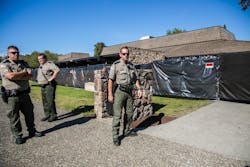Grisly Ore. Shooting Scene Taking Toll on Responders
One described having to help move a lifeless body to get to someone who was still alive, said Rob Bullock, deputy fire chief of Douglas County Fire District 2. One firefighter lost a son and a paramedic lost a niece in the massacre that left a teacher and eight students dead and nine other wounded.
"This could be a career-ending event for many of them," Bullock said Wednesday. "This wasn't something we ever expected to experience. It's changed the face of our department forever."
Forty-five firefighters and paramedics and five chief officers from the department flooded the campus that day – a little less than half of its staff. Its headquarters is about six miles away from the college.
Some staff members wish they could have done more, Bullock said. The range of emotions that colleagues have expressed in the days since the shooting have been "all over the board," he said. The department has 120 full- and part-time staff members and volunteers ranging in age late teens to early 50s. The department covers rural Douglas County.
"I find myself not knowing what to say to some of these people at times," he said. "I understand what they're going through, but I'll never know."
Bullock was in Maryland during the shooting at the National Fire Academy for executive officer training. He wishes he had been home. The department sent four fire engines and 10 of its ambulances to the college that day.
Bullock has told the staff – early and often -- that he's proud of them. It took about 50 minutes from the time crews loaded the first person into an ambulance to the last patient.
About 20 members of the department responded initially, he said. Others who weren't working joined them as soon as they heard. One group of off-duty paramedics packed into a pickup and drove to the scene to help, he said. Car crashes are typically the worst trauma they handle, he said.
The firefighters have largely relied on each other and a volunteer chaplain when they need to talk about what happened, Bullock said. Some have elected not to talk about it at all. Some have picked up extra shifts to stay busy and keep their minds off the shooting, he said.
The fire department has gotten offers from ministries all over the world to help the staff cope. Other fire agencies have volunteered their crew members to allow the Roseburg firefighters to take time off.
"All we can do is try to move forward one day at a time, but some of us are really having a hard time with this," said Bullock, who received an associate's degree in fire science and his paramedic certificate through the college.
"For emergency personnel like us, what's traumatic to a lot of people is regular operations for us. But what's traumatic for us goes well beyond what the average person ever should see."
-- Everton Bailey Jr.
———
©2015 The Oregonian (Portland, Ore.)
Visit The Oregonian (Portland, Ore.) at www.oregonian.com
Distributed by Tribune Content Agency, LLC.
